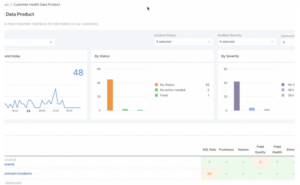
Track Data Product Health and Reliability with Monte Carlo’s Latest Dashboard

Monte Carlo has announced a new capability in its observability suite, the Data Product Dashboard.
The new dashboard gives data teams a window into the health and reliability of the tables, training sets, and other assets powering data products, Monte Carlo says. Monte Carlo says the new Data Product Dashboard allows users to define a data product, track its health, and report on its reliability to stakeholders directly in the company’s observability platform.
Monte Carlo defines data products as applications or assets that deliver trusted information or services to downstream consumers. One example is an airline’s flight tracking system that combines real-time GPS data, flight manifest tables, and historical arrival and departure information to keep travelers informed. (Read Datanami’s deep dive into data products here.)
Jesse Miller, product leader at Monte Carlo, told Datanami that data products are gaining importance in organizations as they bridge the gap between raw data and actionable insights to impact business outcomes.
“With our Data Product Dashboards, Monte Carlo empowers data teams to build trustworthy data products by providing visibility into critical data asset health and reliability. Customers are already using this solution to foster trust, collaboration, and the adoption of reliable data within their organizations,” he said.
 A company blog post penned by Miller describes how data products have emerged as a new and impactful data management framework that can ensure tables, reports, ML models, and other assets are directly tied to tangible business outcomes. But the data feeding these products must be accessible, trustworthy, and performant.
A company blog post penned by Miller describes how data products have emerged as a new and impactful data management framework that can ensure tables, reports, ML models, and other assets are directly tied to tangible business outcomes. But the data feeding these products must be accessible, trustworthy, and performant.
Bad data going downstream has consequences. Data trust is a major hurdle to data product adoption according to a recent Monte Carlo and Wakefield Research survey of data engineers. The survey that showed bad data impacted 31% of revenue, and 74% of respondents reported stakeholders being the first to identify data problems most or all of the time.
To address this issue, Data Product Dashboard allows users to identify which data assets are feeding specific data products, based on tables, reports, dashboards, and models. Users can select relevant tables and their associated assets to define specific data products, thereby keeping everyone aligned on data product definitions, Monte Carlo asserts.
The dashboard also reports on key data health metrics and KPIs over time. These include the number of incidents impacting a given data product, incident status and severity, and monitor coverage for the tables feeding a given product. Additionally, the dashboard allows for data product reliability reporting to downstream stakeholders.

Data Product Dashboard is the latest tool in Monte Carlo’s data observability suite. (Source: Monte Carlo)
The Data Product Dashboard is the newest addition to Monte Carlo’s observability suite. It is joining the Data Reliability Dashboard, released last October, and the Table Health Dashboard, launched in February. Miller says the Data Product Dashboard takes Monte Carlo’s vision for data observability a step further by giving organizations the ability to segment, define, and monitor tables and other upstream assets based on the internal or external data products powering them.
Monte Carlo CEO and Co-founder Barr Moses, one of Datanami’s 2023 People to Watch, said in a statement that as companies ingest larger volumes of data, the opportunity to build impactful and innovative data products exponentially grows. But in order for data products to reach their full potential, data teams must give them the same attention as software applications to ensure accessibility, performance, and reliability.
“Data Product Dashboard is the first solution of its kind to help organizations manage and improve the data quality of the tables and assets powering their most critical data products, and in the process, foster greater trust and collaboration between data teams and their stakeholders,” Moses said.
Related Items:
Monte Carlo Raises $135 Million to Grow Data Observability Biz
In Search of Trustworthy Data Products
How to Build Great Data Products
June 13, 2025
- PuppyGraph Announces New Native Integration to Support Databricks’ Managed Iceberg Tables
- Striim Announces Neon Serverless Postgres Support
- AMD Advances Open AI Vision with New GPUs, Developer Cloud and Ecosystem Growth
- Databricks Launches Agent Bricks: A New Approach to Building AI Agents
- Basecamp Research Identifies Over 1M New Species to Power Generative Biology
- Informatica Expands Partnership with Databricks as Launch Partner for Managed Iceberg Tables and OLTP Database
- Thales Launches File Activity Monitoring to Strengthen Real-Time Visibility and Control Over Unstructured Data
- Sumo Logic’s New Report Reveals Security Leaders Are Prioritizing AI in New Solutions
June 12, 2025
- Databricks Expands Google Cloud Partnership to Offer Native Access to Gemini AI Models
- Zilliz Releases Milvus 2.6 with Tiered Storage and Int8 Compression to Cut Vector Search Costs
- Databricks and Microsoft Extend Strategic Partnership for Azure Databricks
- ThoughtSpot Unveils DataSpot to Accelerate Agentic Analytics for Every Databricks Customer
- Databricks Eliminates Table Format Lock-in and Adds Capabilities for Business Users with Unity Catalog Advancements
- OpsGuru Signs Strategic Collaboration Agreement with AWS and Expands Services to US
- Databricks Unveils Databricks One: A New Way to Bring AI to Every Corner of the Business
- MinIO Expands Partner Program to Meet AIStor Demand
- Databricks Donates Declarative Pipelines to Apache Spark Open Source Project
June 11, 2025
- What Are Reasoning Models and Why You Should Care
- The GDPR: An Artificial Intelligence Killer?
- Fine-Tuning LLM Performance: How Knowledge Graphs Can Help Avoid Missteps
- It’s Snowflake Vs. Databricks in Dueling Big Data Conferences
- Snowflake Widens Analytics and AI Reach at Summit 25
- Top-Down or Bottom-Up Data Model Design: Which is Best?
- Why Snowflake Bought Crunchy Data
- Inside the Chargeback System That Made Harvard’s Storage Sustainable
- Change to Apache Iceberg Could Streamline Queries, Open Data
- dbt Labs Cranks the Performance Dial with New Fusion Engine
- More Features…
- Mathematica Helps Crack Zodiac Killer’s Code
- It’s Official: Informatica Agrees to Be Bought by Salesforce for $8 Billion
- AI Agents To Drive Scientific Discovery Within a Year, Altman Predicts
- Solidigm Celebrates World’s Largest SSD with ‘122 Day’
- DuckLake Makes a Splash in the Lakehouse Stack – But Can It Break Through?
- The Top Five Data Labeling Firms According to Everest Group
- Who Is AI Inference Pipeline Builder Chalk?
- IBM to Buy DataStax for Database, GenAI Capabilities
- ‘The Relational Model Always Wins,’ RelationalAI CEO Says
- VAST Says It’s Built an Operating System for AI
- More News In Brief…
- Astronomer Unveils New Capabilities in Astro to Streamline Enterprise Data Orchestration
- Yandex Releases World’s Largest Event Dataset for Advancing Recommender Systems
- Astronomer Introduces Astro Observe to Provide Unified Full-Stack Data Orchestration and Observability
- BigID Reports Majority of Enterprises Lack AI Risk Visibility in 2025
- Gartner Predicts 40% of Generative AI Solutions Will Be Multimodal By 2027
- Databricks Announces Data Intelligence Platform for Communications
- MariaDB Expands Enterprise Platform with Galera Cluster Acquisition
- Databricks Unveils Databricks One: A New Way to Bring AI to Every Corner of the Business
- Databricks Announces 2025 Data + AI Summit Keynote Lineup and Data Intelligence Programming
- FICO Announces New Strategic Collaboration Agreement with AWS
- More This Just In…


























